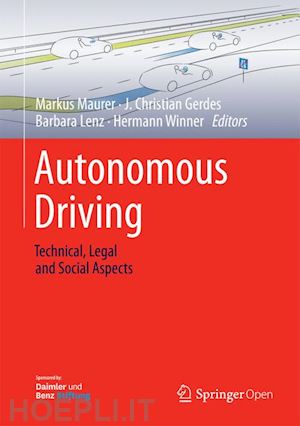
Questo prodotto usufruisce delle SPEDIZIONI GRATIS
selezionando l'opzione Corriere Veloce in fase di ordine.
Pagabile anche con Carta della cultura giovani e del merito, 18App Bonus Cultura e Carta del Docente
This book takes a look at fully automated, autonomous vehicles and discusses many open questions: How can autonomous vehicles be integrated into the current transportation system with diverse users and human drivers? Where do automated vehicles fall under current legal frameworks? What risks are associated with automation and how will society respond to these risks? How will the marketplace react to automated vehicles and what changes may be necessary for companies?
Experts from Germany and the United States define key societal, engineering, and mobility issues related to the automation of vehicles. They discuss the decisions programmers of automated vehicles must make to enable vehicles to perceive their environment, interact with other road users, and choose actions that may have ethical consequences. The authors further identify expectations and concerns that will form the basis for individual and societal acceptance of autonomous driving. While the safety benefits of such vehicles are tremendous, the authors demonstrate that these benefits will only be achieved if vehicles have an appropriate safety concept at the heart of their design. Realizing the potential of automated vehicles to reorganize traffic and transform mobility of people and goods requires similar care in the design of vehicles and networks. By covering all of these topics, the book aims to provide a current, comprehensive, and scientifically sound treatment
of the emerging field of “autonomous driving".About the Editors:
- Markus Maurer studied electrical engineering at Technische Universität München, and obtained a doctorate at Bundeswehr Universität München. He started his career in industry as a project manager and head of department in the development of driver-assistance systems at Audi AG. He is a professor of electronic vehicle systems at Technische Universität in Braunschweig.
- Chris Gerdes is a Professor of Mechanical Engineering at Stanford University, Director of the Center for Automotive Research at Stanford (CARS) and Director of the Revs Program at Stanford University, Stanford, USA.
- Barbara Lenz studied geography and German studies to postdoctoral level at Universität Stuttgart, where she was also research assistant and project manager in the area of economic geography at the Institute of Geography. She is Head of the Institute of Transport Research at the German Aerospace Centre (DLR) and a professor of transport geography at Humboldt Universität, both in Berlin.
- Hermann Winner studied physics to doctoral level at Universität Münster before he started his career in industry in advanced engineering and later in series development at Robert Bosch GmbH where he was responsible for driver assistance
systems. He is a professor for automotive engineering at Technische Universität in Darmstadt.










Il sito utilizza cookie ed altri strumenti di tracciamento che raccolgono informazioni dal dispositivo dell’utente. Oltre ai cookie tecnici ed analitici aggregati, strettamente necessari per il funzionamento di questo sito web, previo consenso dell’utente possono essere installati cookie di profilazione e marketing e cookie dei social media. Cliccando su “Accetto tutti i cookie” saranno attivate tutte le categorie di cookie. Per accettare solo deterninate categorie di cookie, cliccare invece su “Impostazioni cookie”. Chiudendo il banner o continuando a navigare saranno installati solo cookie tecnici. Per maggiori dettagli, consultare la Cookie Policy.